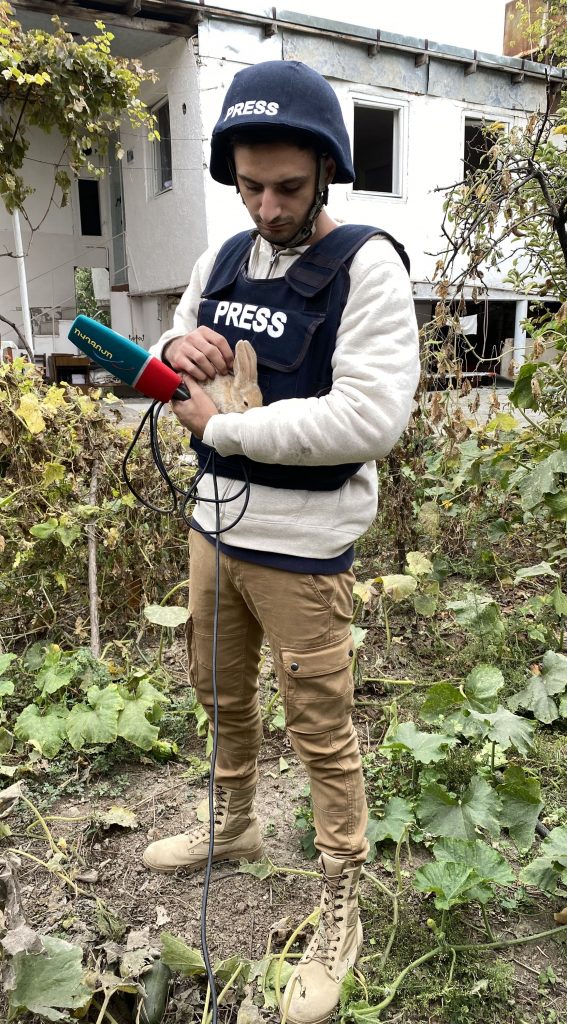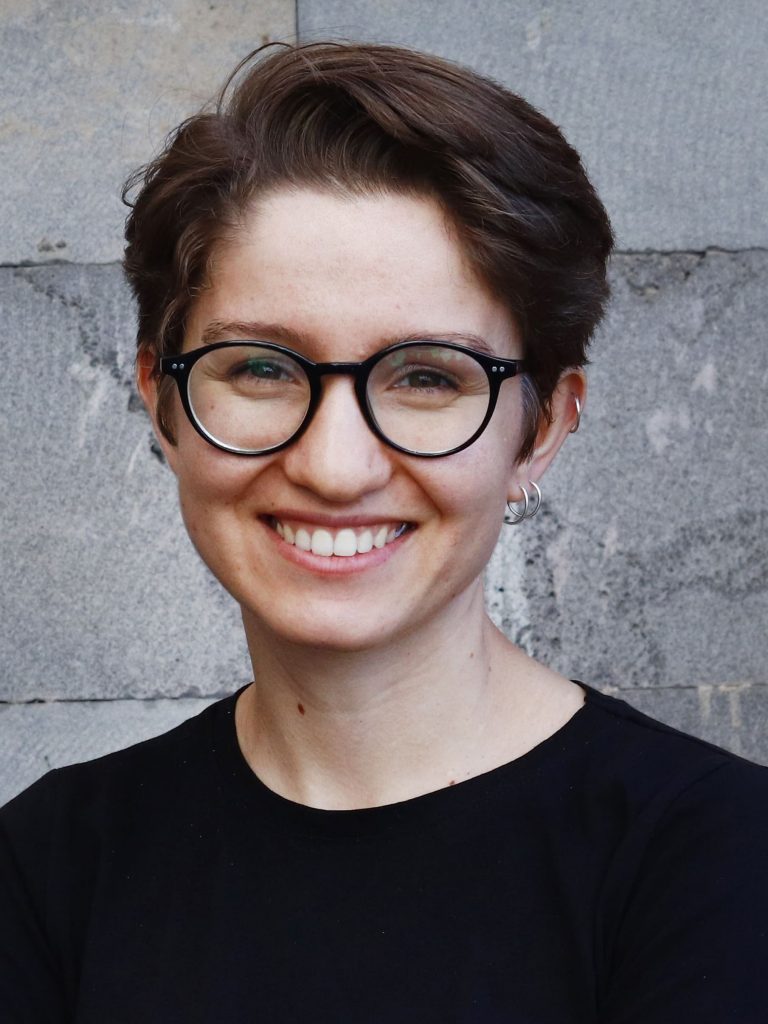When the war broke out in Nagorno-Karabakh in September 2020, lots of Armenian journalists spontaneously became war correspondents. Many were not ready to work in such a situation neither physically nor mentally. As a result, they now suffer from secondary post-traumatic stress disorder (PTSD) and traumas. Moreover, if in Europe media organizations do provide journalists with health insurance, including mental health, most Armenian media companies don’t. Journalists, thus, are left alone with their struggles after the war.
by Lusine Voskanyan
The German perspective
Olivia Kortas, a German-Polish freelance reporter who covers crises across the world, says that one of the ways she fights traumas or shocks after work is by talking with friends and loved ones. “After the migrant crisis on the border in Belarus, I think I talked with a friend for two hours after I came back to Warsaw,” says Olivia.

Olivia is a freelancer and says many organizations do not promise that they will help with a psychologist after the work is done. “That’s why I ask from the beginning and make it clear that it is something I need. So I have a psychologist to talk to if I need it. Five years ago, I did not have that understanding that I could ask my media for that opportunity.”
The media outlets that Olivia works with usually agree. Some organizations, however, do not have that budget, and they may refuse to provide crisis insurance.
Alfred Hackensberger’s (WELT) first experience of covering а war was in Lebanon in 2006, yet he stopped covering wars up until the 2010s when the wave of “Arab spring” started in the Middle East.
“It was my region, and I was responsible for it. Suddenly, I was a war reporter. But now I cover the war in Ukraine because I am the most experienced in the newspaper.” The perception of normal life changes after covering a war.
“When you get back to normal life, and you hear noise, you start worrying and asking yourself what that was. Because when you are on the frontline, you have to listen carefully to any kind of sound. Your life can depend on it”, says Hackensberger. The reporter tells he does not have trauma or PTSD; however, there are moments when he feels the wars’ influence on his life.

“I had an appointment with a dentist, and he blindfolded me because there was too much light in the room. And I realized that I couldn’t stand it. I don’t like hospitals anymore, and I don’t go there. Before, it was not a problem for me. But I see so many deaths there. It has nothing to do with my life; it’s the consequences of the work I do.”
Alfred Hackensberger says that the media he works for would provide psychological help if he asked for it, but he never did. “I would not say that I have trauma. I like it”. He loves working as a war correspondent and thinks maybe that is his own trauma.
Nevertheless, the life of the journalist has changed a lot since he started to cover conflicts.
“When you get home, you feel isolated. Because you have other concerns than “normal people”. A lot of things are not important to me. I have other issues to talk about. People have their “little things” to worry about, but I don’t understand that. There’s a big difference between us. In Germany, the problems are like what to wear, what to eat, what film to watch, and these kinds of things.”
Hackensberger confesses he could not live in Europe anymore and moved to Morocco a few years ago.
The Armenian perspective

Ani Grigoryan (Civilnet) was the editor-in-chief of the Fact Investigation Platform when the war broke out in Nagorno-Karabakh in 2020. When the first reports spread about war crimes committed by the Azerbaijani side, Ani decided to go to the warzone in order to have more information about the real situation.
“It would be a lie if I said that psychologically I was ready to go there. Everything happened too fast, and I didn’t have time to think about what could happen. I was quite enthusiastic about the trip as I knew that my work was more important there. That was a priority for me,” says Ani.
She had two trips to Nagorno-Karabakh during the weeks and spent about 20 out of 44 days of the war there: the first day of the second trip was especially difficult.
“We almost reached Stepanakert [the capital city of Nagorno-Karabakh], so we decided to wear our body armor, and exactly at that moment, we heard the sound of an explosion. I asked myself, ‘again?’… I was not scared. I was overwhelmed because I knew that from that moment on, the constant stress would not leave me.”
Due to the never-ending political turmoil of post-war Armenia, Ani admits that for a long time she did not have time to reflect on her experience while covering the war.
“Only months after the war did I realize that I had health issues because of the stress I had experienced there. It took too much time to explain to myself that some of my actions were a result of that very experience.”
Ani believes that professional help is vital for journalists. “Therapy helped me look at things from a very pragmatic and adequate angle. I discussed what happened to me with my psychologist, and thanks to those conversations, I got answers to many questions. It helped a lot.”
Ani, now the team lead of fact-checking department of Civilnet, says that media companies do not even discuss the need to provide journalists with psychological assistance.
“News organizations do not feel responsible for their employees. 95 percent of journalists working on the frontline in 2020 were not professional war correspondents and had no training. I witnessed how many journalists worked without body armor during the war. We were lucky that none of us died.”
And even after the war, only a few news organizations were interested in the mental state of their employees. “No one asks a journalist ‘how are you?’ after they are back from the frontline, or whether they are able to work. This is quite problematic. News organizations must take steps to improve the mental health of their employees. After all, the productivity of a journalist depends on that.”

Avetis Harutyunyan (“Armenia TV”) traveled to Nagorno-Karabakh the next day the war started in 2020. A few days later, Avetis and his cameraman headed to Martuni with groups of local and international journalists. After an hour of filming and interviewing residents, the groups regathered and were about to leave for Stepanakert. Suddenly Azerbaijani forces began shelling them with Grad missiles.
The first missile exploded several meters away from them. “Then within split seconds, one missile followed another. The ground was shaking, smoke was everywhere. I barely saw where we were rushing. We entered a building and ran through a corridor when another missile fell and exploded in front of us,” Avetis recalls.
One of the missiles hit a car, burning it to the ground. “We hurried to an underground shelter, where I noticed that Aram, my cameraman, was wounded. His hand was soaked in blood. I immediately removed the material and tried to look at the wound on his back, to bandage it and stop the bleeding.”
Avetis says that he became extremely sensitive to loud noise after what he experienced during the war. “Once at night I woke up to the sound of fireworks, and it seemed to me that Grad shells were exploding around me again. Another day a pan fell in the kitchen and it again reminded me of the sound of an explosion. After the war and having appeared under shelling, I associate all loud noises with explosions.”
Avetis believes that the journalists who covered the war from the frontlines need to be heard.
“There is an impression that journalists are constantly telling stories and don’t really need to talk more. It’s a common misconception. Journalists experience more than they speak or write, and very often, it is necessary to create conditions for them so that the memories of the war are at least softened, and the sounds of missiles’ explosions are silenced.”
This article was published within the frames of “Correspondents in Conflict” Project,
implemented by Yerevan Press Club and Deutsche Gesellschaft e. V. The Project is
funded by the German Federal Foreign Office within the “Eastern Partnership Program”.
The contents of this article are the sole responsibility of the implementing partners and can in
no way be taken to reflect the views of the Federal Foreign Office. #civilsocietycooperation
 Lusine Voskanyan graduated from the Department of Journalism of Yerevan State University in 2013. She covered politics and social developments during the first years of her career keeping gender issues and women’s rights in the spotlight of her stories. In 2019, she did volunteer work in Pula (Croatia) within the framework of the European Solidarity Corps, by co-authoring a radio program at RadioRojc. Since 2019, Lusine has been working at the Fact Investigation Platform as a journalist. The focus of her work is the fight against disinformation and media manipulations.
Lusine Voskanyan graduated from the Department of Journalism of Yerevan State University in 2013. She covered politics and social developments during the first years of her career keeping gender issues and women’s rights in the spotlight of her stories. In 2019, she did volunteer work in Pula (Croatia) within the framework of the European Solidarity Corps, by co-authoring a radio program at RadioRojc. Since 2019, Lusine has been working at the Fact Investigation Platform as a journalist. The focus of her work is the fight against disinformation and media manipulations.












